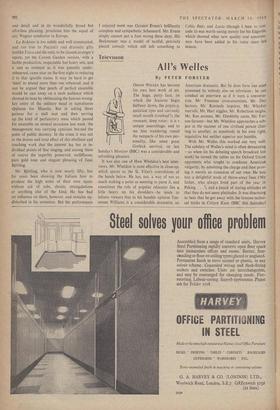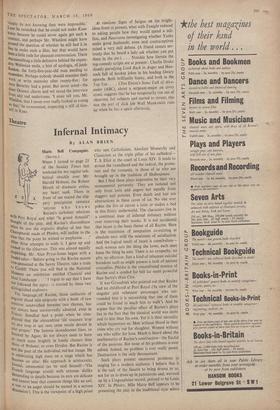Television
All's Welles
By PETER FORSTER It was also one of Huw Wheldon's best inter- views. Mr. Wheldon is most effective in close-up, which spares us the St. Vitus's convulsions of the hands below. He has, too, a way of not so much making a point as seeming to parse it, and sometimes the role of popular educator lies a little heavy on his shoulders—he tends to inform viewers that in his humble opinion Ten- nessee Williams is a considerable dramatist, an American dramatist. But he does have one asset possessed by 'nobody else on television : he can conduct an interview as if it were a conversa- tion. Mr. Freeman cross-examines, Mr. Day hectors, Mr. Kennedy inquires, Mr. Whicker marvels, Mr. Hart niggles, Mr. Robertson neighs, Mr. Kee accuses, Mr. Dimbleby cares, Mr. Far- son farsons—but Mr. Wheldon approaches a sub- ject in the manner of one civilised person chat- ting to another, as somebody in his own right, inquisitive but neither superior nor humble.
With Mr. Welles this worked out very well. The subtlety of Welles's mind is often devastating —as when (in his debating speech broadcast last week) he turned the tables on his Oxford Union opponents who sought to condemn American vulgarity, by admitting the charge and then prov- ing it merely an extension of our own. He has, too, a delightful stock of throw-away lines (WY father, who always lived part of the year in Peking . .'), and a knack of stating attitudes so that they do not seem platitudes. It was disarming to hear that he got away with the famous techni- cal tricks in Citizen Kane (BBC this Saturday) 'simPlY by not knowing they were impossible.' Later he remarked that he could not make Kane today because he could never again get such a contract, and perhaps Mr. Wheldon might have
P i
pressed the question of whether he still had it in hue to make such a film; but that would have been a little rude for pleasant conversation. There was something a little defensive behind the expan- sive, Wellesian smile, a hint of apologia, of justi- fication, the forty-five-year-old man needing to remember. Perhaps nobody should examine their Work or write memoirs after twenty-five: for once Beverley had a point. But never mind—the sheer Orsonic charm and wit saved the interview Iron) any sad undertones. 'I must tell you, Mr. Wheldon, that I never ever really looked as young as that,' he commented, inspecting a still of him- self in Kane. At random: Signs of fatigue on the bright- ideas front at present, what with Tonight reduced to asking people how they would spend a mil- lion, and Panorama investigating whether Yanks make good husbands; even oral contraceptives raised a very dull debate. (A friend swears ser- iously that he heard a lady ask whether you put them in the ear.) . . . Notable how literate the top comedy scripts are at present : Charlie Drake closely parodying Look Back in Anger and Han- cock full of booksy jokes in his lending library episode. Both brilliantly funny, and both in the Top Ten. . . Clive Exton's Some Talk of Alex- ander (ABC), about a sergeant-major on civvy street, suggests that he has temporarily run out of observed, felt subjects and started to invent; this was the sort of slick job Wolf Mankowitz runs up when he has a spare afternoon.



































 Previous page
Previous page